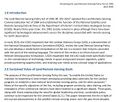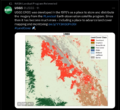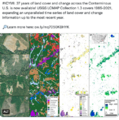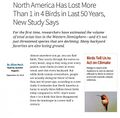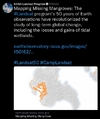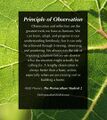Category:Bioregionalism: Difference between revisions
Siterunner (talk | contribs) No edit summary |
Siterunner (talk | contribs) No edit summary |
||
| Line 25: | Line 25: | ||
Most 'bioregionalists' see humanity and its culture as a part of nature, focusing on building a positive, sustainable relationship with the environment. Some have become more engaged in off-shoots of the bioregional 'ecoregions' scientific concept. The core idea of most bioregionalists is to regard nature in terms of natural processes. Dogmatic bioregionalists at times tend to reject participation in 'artificial' constructs such as 'nationalism' and political systems such as countries and states. | Most 'bioregionalists' see humanity and its culture as a part of nature, focusing on building a positive, sustainable relationship with the environment. Some have become more engaged in off-shoots of the bioregional 'ecoregions' scientific concept. The core idea of most bioregionalists is to regard nature in terms of natural processes. Dogmatic bioregionalists at times tend to reject participation in 'artificial' constructs such as 'nationalism' and political systems such as countries and states. | ||
The bioregionalism of ecoregions captures earth science that goes beyond borders and looks to a systems approach to the study of interconnected bio-systems: | The bioregionalism of ecoregions captures earth science that goes beyond legal/political borders and looks to a systems approach to the study of [http://www.greenpolicy360.net/w/Bioregionalism:_What_If_We_Based_Our_Borders_on_Nature interconnected bio-systems]: | ||
http://en.wikipedia.org/wiki/Lists_of_ecoregions | http://en.wikipedia.org/wiki/Lists_of_ecoregions | ||
Revision as of 17:54, 17 July 2016
http://www.resilience.org/articles/General/2015/08_Aug/watershed.jpg
http://en.wikipedia.org/wiki/Bioregionalism
The term was coined by Allen Van Newkirk, founder of the Institute for Bioregional Research, in 1975, given currency by Peter Berg and Raymond Dasmann in the early 1970s, and has been advocated by writers such as Kirkpatrick Sale.
The bioregionalist perspective opposes a homogeneous economy and consumer culture with its lack of stewardship towards the environment. This perspective seeks to:
Ensure that political boundaries match ecological boundaries.
Highlight the unique ecology of the bioregion.
Encourage consumption of local foods where possible.
Encourage the use of local materials where possible.
Encourage the cultivation of native plants of the region.
Encourage sustainability in harmony with the bioregion.
_ _ _ _ _ _ _ _ _ _ _ _ _ _ _ _ _ _ _ _ _ _ _ _ _ _ _ _
Most 'bioregionalists' see humanity and its culture as a part of nature, focusing on building a positive, sustainable relationship with the environment. Some have become more engaged in off-shoots of the bioregional 'ecoregions' scientific concept. The core idea of most bioregionalists is to regard nature in terms of natural processes. Dogmatic bioregionalists at times tend to reject participation in 'artificial' constructs such as 'nationalism' and political systems such as countries and states.
The bioregionalism of ecoregions captures earth science that goes beyond legal/political borders and looks to a systems approach to the study of interconnected bio-systems:
http://en.wikipedia.org/wiki/Lists_of_ecoregions
Pages in category "Bioregionalism"
The following 10 pages are in this category, out of 10 total.
Media in category "Bioregionalism"
The following 58 files are in this category, out of 58 total.
- A root and its mycorrhizal fungus surroundings.PNG 315 × 382; 236 KB
- Anthropocene time.png 1,152 × 485; 892 KB
- Audubon study ms.png 529 × 434; 437 KB
- Bill Mollison 1928-2016.pdf ; 99 KB
- Bill Mollison courtesy of Permaculture magazine.jpg 460 × 300; 0 bytes
- Bill Mollison the day after his passing memories.png 1,381 × 651; 1.65 MB
- Bug eyes in the rainforest canopy Photo by Don Perry.jpg 391 × 576; 27 KB
- Celebrating 50 Years of Landsat.png 600 × 610; 909 KB
- Connect with Nature.png 405 × 280; 17 KB
- Don Perry In the Canopy first-gen canopy web.jpg 720 × 487; 81 KB
- Earth-science.png 265 × 83; 13 KB
- Earth360 Nasa blue marble s.jpg 275 × 282; 0 bytes
- EarthDayatNASA .jpg 1,088 × 870; 745 KB
- EnvSecurity.jpg 245 × 71; 13 KB
- Floating Forest Project.png 1,106 × 604; 1,020 KB
- Florida rights of nature lawsuit - May 2021.jpg 527 × 806; 179 KB
- Fly.jpg 527 × 255; 19 KB
- Global Biodiversity GBIF.org.png 747 × 273; 208 KB
- Global Biodiversity Information-Data.png 501 × 266; 124 KB
- Global Ecosystems Land Units Mapping.jpg 660 × 515; 98 KB
- Global Fishing Watch.jpg 1,246 × 569; 205 KB
- GlobalFishingWatch.jpg 577 × 820; 302 KB
- Honey-Bee.jpg 192 × 108; 30 KB
- INaturalist butterfly.jpg 1,024 × 683; 202 KB
- Kelp forest off Calif coast collapsing.jpg 773 × 681; 155 KB
- La-Ley-de-la-Madre-Tierra.jpg 352 × 500; 60 KB
- Land Remote Sensing Policy Act of 1992.jpg 563 × 480; 144 KB
- Landsat band imagery2.png 800 × 400; 907 KB
- Landsat data site.png 657 × 600; 499 KB
- Landsat launched 50 years ago today.png 528 × 779; 755 KB
- Landsat NASA - Feb 11 2023.png 763 × 600; 578 KB
- Landsat US collection of maps 1985-2021.png 768 × 775; 1,018 KB
- Landsat, a 50 year legacy.png 528 × 575; 288 KB
- Life Above the Jungle Floor Don Perry Google2015.png 545 × 760; 178 KB
- Life Above the Jungle Floor Don Perry.jpg 395 × 500; 74 KB
- Living Diversity or Not in Your Home Yard.png 436 × 640; 582 KB
- Living Earth.png 441 × 183; 106 KB
- Loss of N American Birds - 1.jpg 800 × 788; 173 KB
- Mangroves and Coastal Wetlands tracked by Landsat.png 600 × 716; 245 KB
- Millennium - loss-of-forest1.jpg 473 × 298; 40 KB
- Mt-des-voeux Nat Geo.jpg 600 × 450; 66 KB
- Mushroom life in the forest.png 640 × 458; 626 KB
- Natural Capital assets mapping UN.png 630 × 269; 17 KB
- Natural Capital Biodiversity.png 670 × 139; 173 KB
- Permaculture-observation tip.jpg 480 × 540; 86 KB
- Rain Garden Design courtesy of www.PermaDesign.com Nate Downey.png 800 × 614; 601 KB
- River basins - watersheds.jpg 800 × 214; 111 KB
- Secrets of the Rainforest some of Don's orig publications w SJS.jpg 395 × 580; 62 KB
- Tara Expedition.png 700 × 437; 697 KB
- Toby Hemenway-RIP Dec2016.png 503 × 327; 32 KB
- Tree canopy.jpg 500 × 375; 61 KB
- US River basins - watersheds.jpg 800 × 477; 131 KB
- Watching the Planet Breathe.jpg 560 × 380; 173 KB
- Watching the Planet Breathe2.jpg 1,235 × 615; 227 KB
- Watching the Planet Breathe3.jpg 1,000 × 405; 290 KB
- Watershed photo via resilience.org.png 700 × 232; 468 KB
- Worldwide view of oceans phytoplankton earth observatory nasa.gif 540 × 270; 0 bytes






















